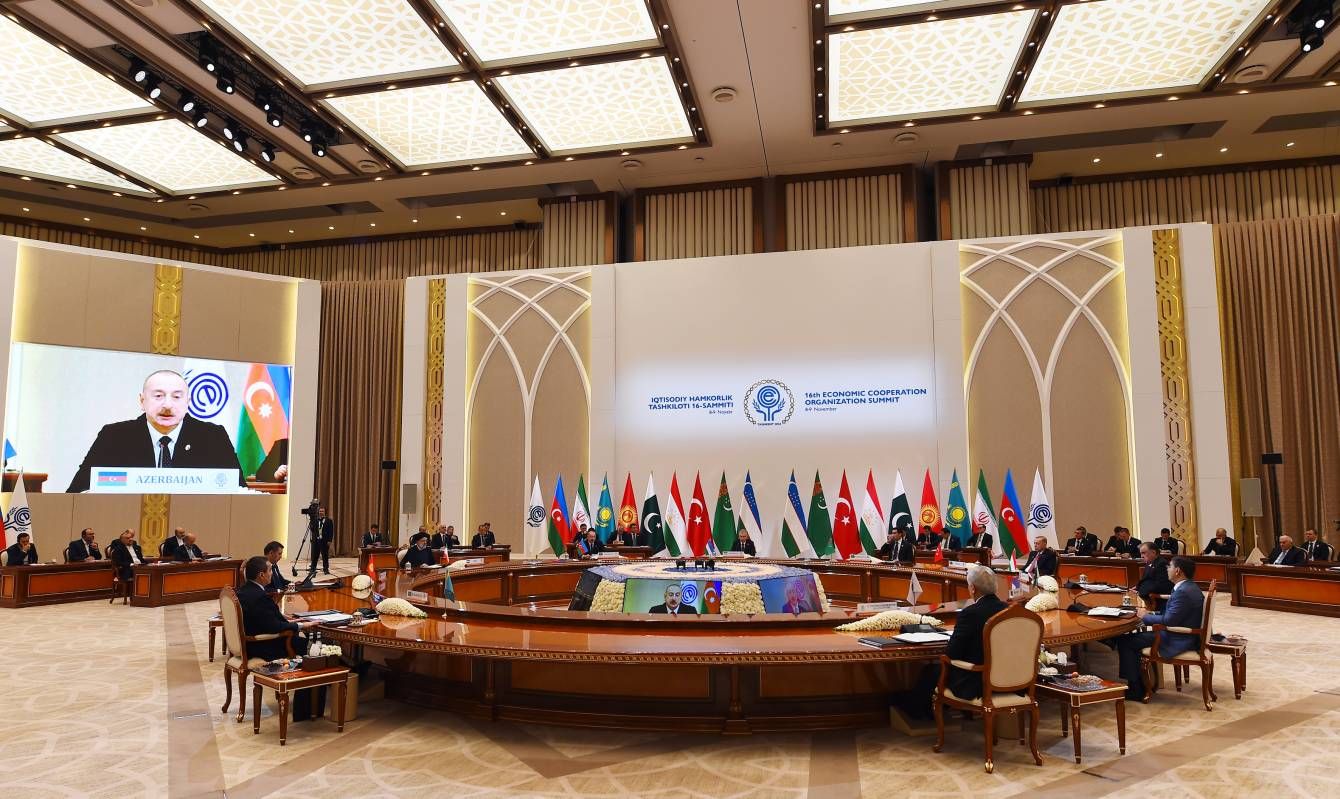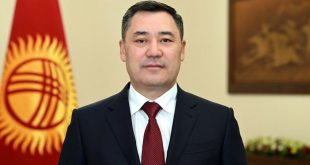
ECO, established in 1985, is a world-known organization whose importance increases year by year. Even some predict that the organization will follow the EU and will turn into a single market. As is known the organization frequently holds multilateral Summits to discuss investment, trade, transport, and much more in relevant fields. The last summit, which was called the 16th ECO Summit was held in Uzbekistan and leaders of member countries, including the President of Azerbaijan, Ilham Aliyev, participated in the summit and had fruitful meetings.
“Azerbaijan is determined to further strengthen bilateral and multilateral cooperation with the ECO Member States,” President of Azerbaijan Ilham Aliyev said while addressing the 16th Summit of the Economic Cooperation Organization held in Tashkent, Uzbekistan.
Azerbaijan is indeed one of the countries in the South Caucasus that gives importance to economic cooperation. Despite the fact that its territories have been under occupation for over three decades, Azerbaijan has always managed to maintain a high pace of its economy. Today, Azerbaijan is also becoming a green energy country. This trend, which started in Azerbaijan, has made it possible for the country to appear among the most interesting partners both in the West and in the East.
Besides, expert opinion on the recent 16th summit meeting of the ECO was also obtained.
In an interview with AZERNEWS on the issue, CEO, and Belt & Road Consultans Pvt Limited Muhammad Asif Noor noted that the 16th ECO Summit held in Tashkent on November 9, 2023, under the thematic banner “Through Cooperation to Economic Stability and Development” provided a platform for the heads of state and government from ECO member countries to address regional concerns and foster collaboration across diverse sectors. Speaking in detail, he pointed out that the summit proved to be a significant point in the ECO’s trajectory, with specific objectives. It sought to evaluate the ongoing activities of the organization and measure the current state of regional cooperation in priority sectors. Additionally, it charted the course for the ECO’s future activities, outlining directions that would steer the organization toward greater efficiency and impact.
According to Noor, the summit strengthened the organization’s activities, with the aim of developing a climate conducive to expanding trade and economic cooperation among member states. “The anticipated outcomes held the promise of propelling the ECO to new heights, with President Shavkat Mirziyoyev expressing confidence in the event’s success. As the leaders assembled in Tashkent, the collective efforts and discussions were meant to leave a lasting imprint on the ECO’s journey toward enhanced efficiency and impactful regional cooperation,” he noted.
The expert stressed that there are some points that can be expected moving forward: “Firstly, the summit’s primary objective is to catalyze cooperation among member countries across sectors, including trade, investment, transport, environment, tourism, agriculture, industry, and the green transition. This collaborative effort is set to boost regional development.
Secondly, serving as a platform for member countries to engage in functional discussions, the summit facilitated the examination of regional challenges and the formulation of practical solutions. This process holds the potential to resolve conflicts, promote peace and stability, and contribute to improvement in regional security.
Thirdly, the reinforcement of the ECO’s activities and the expansion of trade and economic collaboration among member states can be seen as a strategic initiative that aims to make the organization work better and have a bigger effect, benefiting the region at large.
And finally, the summit was an important milestone for setting the progression of the organization’s future activities. By providing clear directions, it enabled the ECO to focus on its priorities and execute its goals with improved efficiency,” he noted.
He also touched on the meeting between the leaders of Azerbaijan and Pakistan at the Summit and underscored that the meeting holds significance for deepening collaboration between the two nations. Asif Noor added that the positive progress in bilateral relations, particularly in trade, defense, and energy, signals a potential for increased collaboration. The summit’s focus on expanding trade and economic cooperation among member states can provide a platform to strengthen these ties further.
“The announcement of direct flight operations between Azerbaijan and Pakistan is seen as a positive development. This can enhance people-to-people exchanges and boost two-way business and tourism. Moreover, the summit can facilitate discussions on improving transportation links, contributing to increased connectivity. The discussions on common challenges such as Islamophobia and climate change highlight shared concerns,” he noted.
The Pakistani expert said that the discussions on global and regional developments, including the humanitarian situation in Gaza and issues in Indian Illegally Occupied Jammu & Kashmir (IIOJ&K), emphasize a shared understanding of geopolitical challenges and finally Pakistan’s reaffirmation of support for the sovereignty and territorial integrity of Azerbaijan, especially regarding Garabagh, underscores strong diplomatic ties.
“The Summit provided an opportunity for both countries to collaborate on diplomatic and strategic fronts within the ECO framework and by addressing these issues collectively, it is capable of strengthening the bond between Pakistan and Azerbaijan and fostering a sense of mutual cooperation,” he concluded.
 Oval Useful news from Azerbaijan and Caucasus
Oval Useful news from Azerbaijan and Caucasus


